Gardening is a therapeutic and fulfilling hobby, but for allergy sufferers, it can also be a source of discomfort. The joy of watching your garden bloom shouldn’t be overshadowed by sneezing and itchy eyes. Fortunately, there’s a solution – low allergy flowers for your garden that won’t break the bank. In this blog post, we’re about to unveil the world of mind-blowing affordability by introducing you to the cheapest low-allergen flowers that offer remarkable allergy relief.

The Allergy Dilemma in Gardening
For those of us with allergies, gardening can sometimes feel like a battle against the elements. The beautiful blooms and lush foliage that attract us to our gardens can also trigger sneezing fits and discomfort. But don’t worry, you don’t have to give up your green thumb dreams. By selecting low-allergen flowers, you can enjoy your garden without compromising on health or budget.
Stunning Low Allergy Flowers for your garden
1. Azaleas
Azaleas, with their striking beauty and unique characteristics, can be a surprisingly good choice for allergy sufferers. Here’s why:
- Low-Pollen Production: Azaleas produce minimal pollen compared to many other flowering plants. Since pollen is a common allergen, having low-pollen plants like azaleas can reduce the risk of allergy symptoms.
- Showy Flowers: Azaleas offer vibrant, showy flowers that capture your attention. Their large, colorful blooms make a stunning addition to your garden, providing beauty without aggravating allergies.
- Evergreen Foliage: Many azalea varieties are evergreen, meaning they retain their leaves year-round. This can help filter the air and reduce airborne allergens, providing a cleaner and fresher environment for allergy sufferers.
- Landscaping Benefits: Azaleas are versatile and can be used for landscaping purposes. When strategically placed around your home, they can act as natural barriers, helping to reduce the influx of pollen and allergens from outside.
- Low Maintenance: Azaleas are generally easy to care for, making them an attractive option for gardeners with allergies who want to minimize their time spent in the garden. They require minimal pruning and upkeep.
However, it’s essential to note that individual allergies can vary, and what works for one person may not work for another. If you’re considering adding azaleas to your garden and have allergies, it’s a good idea to consult with an allergist or gardening expert to ensure they are a suitable choice for your specific allergies.
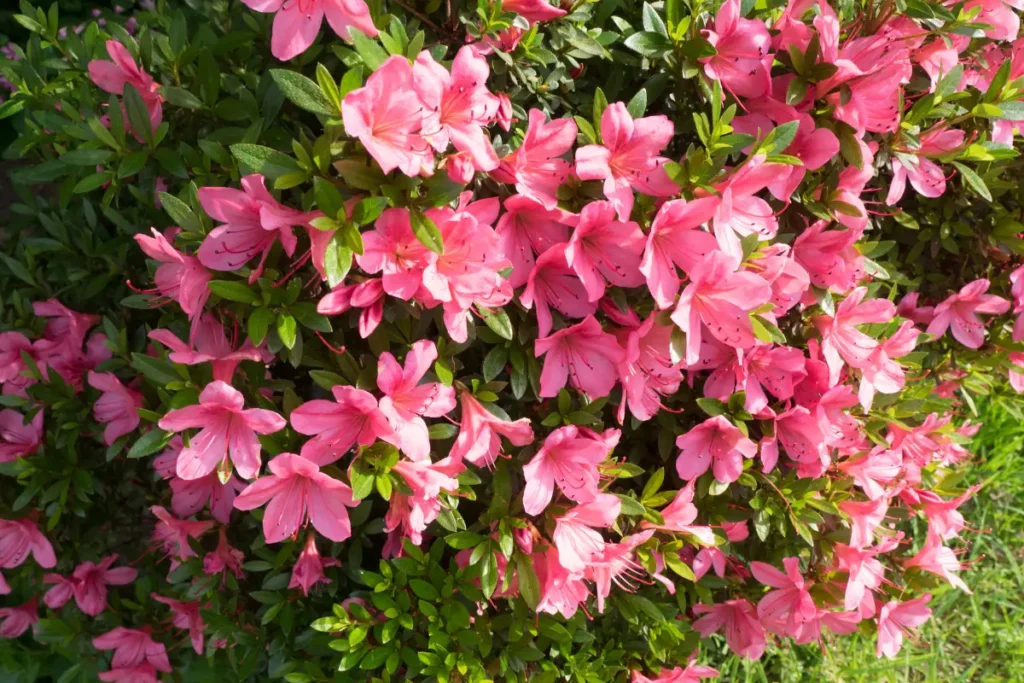
2. Begonias
Begonias are indeed a favorable choice for allergy sufferers, and here’s why:
- Low-Pollen Plants: Begonias are categorized as low-pollen plants, which means they produce minimal airborne pollen. This characteristic is particularly beneficial for allergy sufferers as it reduces the risk of pollen-related allergy symptoms such as sneezing and itchy eyes.
- Showy, Non-Intrusive Flowers: Begonias are known for their beautiful and colorful blooms, which can add aesthetic value to your garden without overwhelming the senses. These showy flowers don’t release excessive pollen, making them an excellent choice for those with allergies.
- Limited Irritants: Unlike some flowers with strong fragrances that can trigger allergies, begonias typically have a mild scent or are entirely fragrance-free. This means they won’t irritate sensitive noses or exacerbate allergy symptoms.
- Versatile for Indoor and Outdoor Use: Begonias are versatile plants that can thrive both indoors and outdoors. This versatility allows you to enjoy their beauty and air-purifying benefits in various settings, whether it’s a garden, balcony, or indoor space.
- Low Maintenance: Begonias are relatively low-maintenance plants, making them suitable for gardeners who want to minimize outdoor exposure. They require moderate watering and can tolerate partial shade, making them adaptable to different environments.
- Air-Purifying Qualities: Begonias are also known for their air-purifying properties. They can help filter out common indoor pollutants, contributing to a cleaner and healthier indoor environment, which can be especially beneficial for allergy sufferers spending time indoors.
While begonias are generally considered allergy-friendly plants, individual allergies can vary. It’s advisable for allergy sufferers to observe their own reactions when introducing new plants to their environment. If you’re considering adding begonias to your garden or indoor space, monitoring your allergy symptoms and consulting with an allergist can help ensure a comfortable and allergen-free experience.
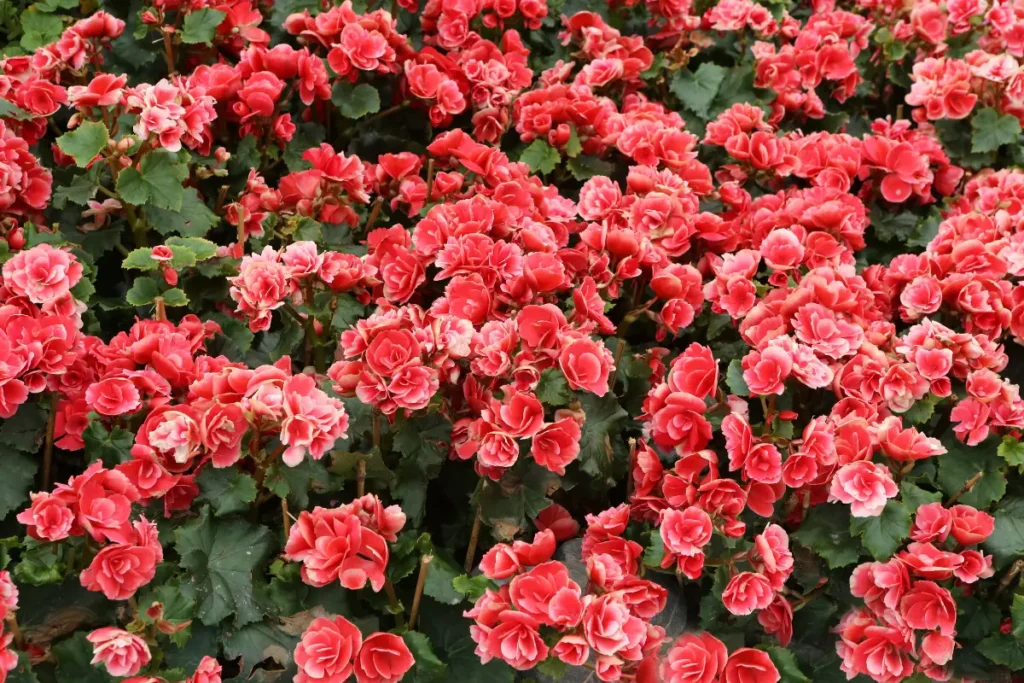

3. Zinnias
Zinnias are an excellent choice for allergy sufferers, and here’s why they can be a fantastic addition to your garden:
- Low-Pollen Blooms: Zinnias are renowned for their vibrant and eye-catching blooms. What makes them particularly suitable for allergy sufferers is their low-pollen production. This characteristic significantly reduces the risk of pollen-related allergies, such as sneezing, itchy eyes, and congestion, allowing you to enjoy their beauty without discomfort.
- Colorful Variety: Zinnias come in a wide array of colors, shapes, and sizes, offering a stunning palette for your garden. You can choose from a variety of zinnia cultivars, including dwarf varieties or taller, more traditional types, to suit your garden’s design and aesthetic preferences.
- Mild Scent: Zinnias typically have a mild, pleasant fragrance or are entirely fragrance-free. Unlike strongly scented flowers that may irritate sensitive noses and airways, zinnias are gentle on the senses, making them an allergy-friendly choice for those sensitive to floral scents.
- Long Blooming Season: Zinnias are known for their extended blooming season, providing you with continuous bursts of color throughout the growing season. This prolonged display of blooms can enhance your outdoor space’s visual appeal without increasing allergen exposure.
- Attracts Pollinators: Zinnias are known to attract pollinators like butterflies and bees. While this may sound counterintuitive for allergy sufferers, it can actually benefit your garden by promoting pollination without triggering pollen allergies. Bees typically collect pollen from flowers like zinnias on their bodies, minimizing airborne pollen.
- Versatile and Easy to Grow: Zinnias are versatile and relatively easy to grow. They are adaptable to different soil types and can thrive in full sun, making them suitable for various garden environments. Their ease of cultivation makes them accessible to both experienced and novice gardeners.
While zinnias are generally considered allergy-friendly plants, individual sensitivities can vary. If you’re an allergy sufferer considering adding zinnias to your garden, it’s advisable to monitor your allergy symptoms as you introduce them to your environment. Overall, zinnias offer a colorful and low-allergen option for those looking to enjoy the beauty of flowers without the discomfort of allergies.
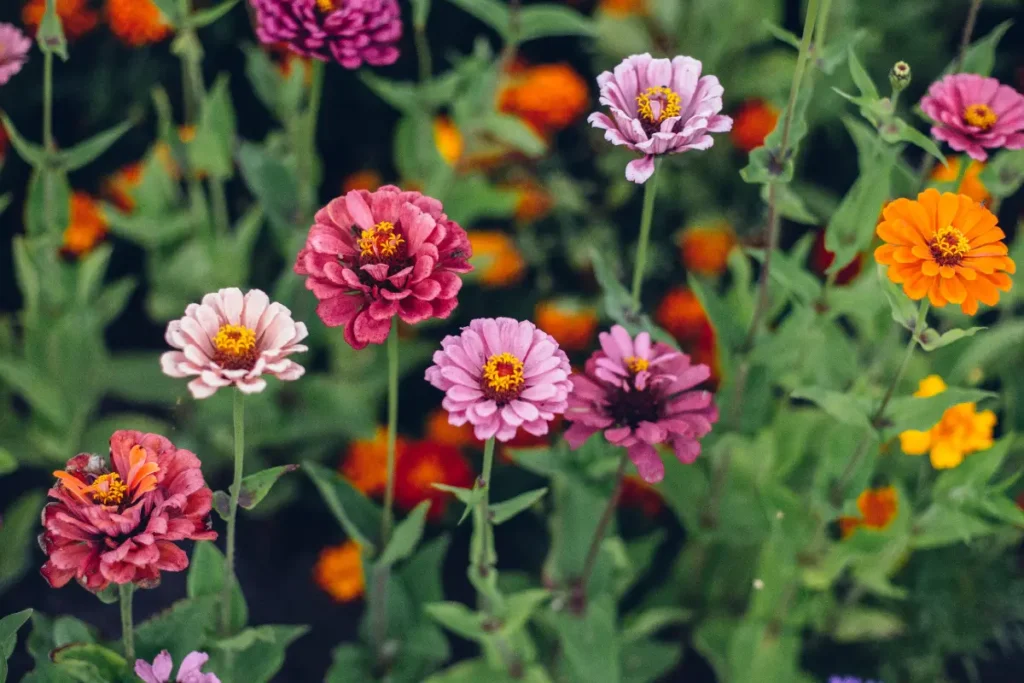
4. Impatiens
Impatiens, commonly known as “Busy Lizzies,” are an excellent choice for allergy sufferers. Here’s why these delightful flowers can be a great addition to your garden, even if you’re prone to allergies:
- Low-Pollen Flowers: Impatiens are known for their vibrant and profuse blooms. What makes them particularly favorable for allergy sufferers is their low-pollen production. They produce very little pollen, reducing the risk of pollen-related allergies such as sneezing and itchy eyes.
- Bright and Colorful: Impatiens come in a wide range of colors, making them a stunning addition to your garden. You can choose from various shades to create a colorful and visually appealing garden space without the worry of aggravating allergies.
- Non-Invasive Fragrance: While some flowers have strong and potentially allergenic fragrances, impatiens are typically fragrance-free or have a very mild scent. This makes them less likely to irritate sensitive noses and airways, ensuring a comfortable environment for allergy-prone individuals.
- Shade Tolerance: Impatiens thrive in shaded or partially shaded areas of your garden. If you have limited exposure to direct sunlight, these flowers can still flourish, offering you the opportunity to enjoy their beauty without excessive outdoor exposure.
- Easy Maintenance: Impatiens are known for their ease of care. They require regular watering and minimal pruning, making them an ideal choice for gardeners who want to minimize time spent outdoors. Their low-maintenance nature allows you to enjoy a beautiful garden without excessive effort.
- Versatility: Impatiens can be grown both in garden beds and containers, offering flexibility in how you choose to incorporate them into your garden. This adaptability allows you to design your garden in a way that suits your space and aesthetic preferences.
While impatiens are generally considered allergy-friendly plants, it’s essential to remember that individual sensitivities can vary. If you’re prone to allergies and considering adding impatiens to your garden, monitor your allergy symptoms as you introduce them to your environment. Overall, impatiens offer a colorful and low-allergen option for those looking to enjoy the beauty of flowers without the discomfort of allergies.
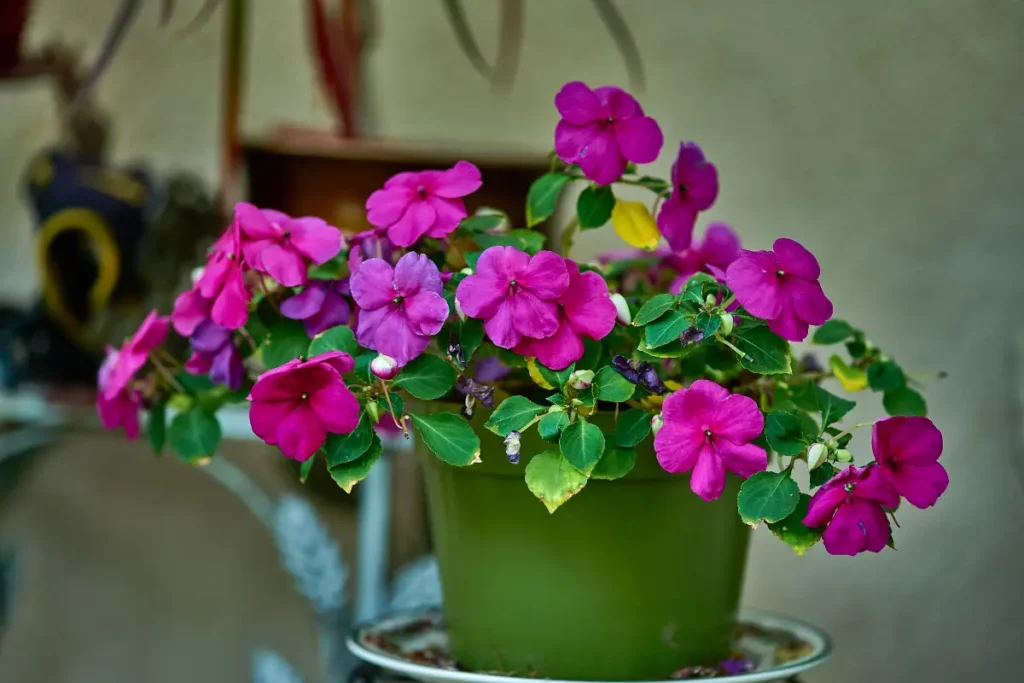

5. Hydrangea
Hydrangeas are an excellent choice for allergy sufferers, and here’s why they can be a beneficial addition to your garden:
- Low-Pollen Blooms: Hydrangeas are known for their stunning and often large, globe-like blooms. What makes them particularly friendly for allergy sufferers is that they produce very little pollen, which is a common trigger for allergies. This means you can enjoy their beauty without worrying about excessive pollen in the air.
- Non-Invasive Fragrance: While some flowers have strong and potentially allergenic fragrances, hydrangeas have a mild, non-invasive scent. Their subtle fragrance is unlikely to irritate sensitive noses or airways, making them a gentle choice for individuals prone to allergies.
- Long Blooming Season: Hydrangeas typically have a long blooming season, providing you with a prolonged display of colorful flowers. This extended period of beauty can enhance your outdoor space without exposing you to excessive allergens.
- Versatile and Adaptable: Hydrangeas come in various varieties and colors, allowing you to choose the one that best complements your garden or outdoor setting. They are adaptable to different climates and can thrive in both sun and shade, making them suitable for various environments.
- Landscaping and Privacy: Beyond their aesthetic appeal, hydrangeas can be used strategically in landscaping to provide privacy and create beautiful hedges. Their lush foliage can act as a natural barrier, reducing the influx of pollen and allergens from outside.
- Low Maintenance: Hydrangeas are generally low-maintenance plants. They require regular watering and minimal pruning, which can be appealing to gardeners who want to minimize outdoor exposure.
While hydrangeas are typically considered allergy-friendly plants, individual sensitivities can vary. If you’re an allergy sufferer considering adding hydrangeas to your garden, it’s advisable to monitor your allergy symptoms as you introduce them to your environment. Overall, hydrangeas offer a beautiful and low-allergen option for those looking to enjoy the charm of flowers without the discomfort of allergies.
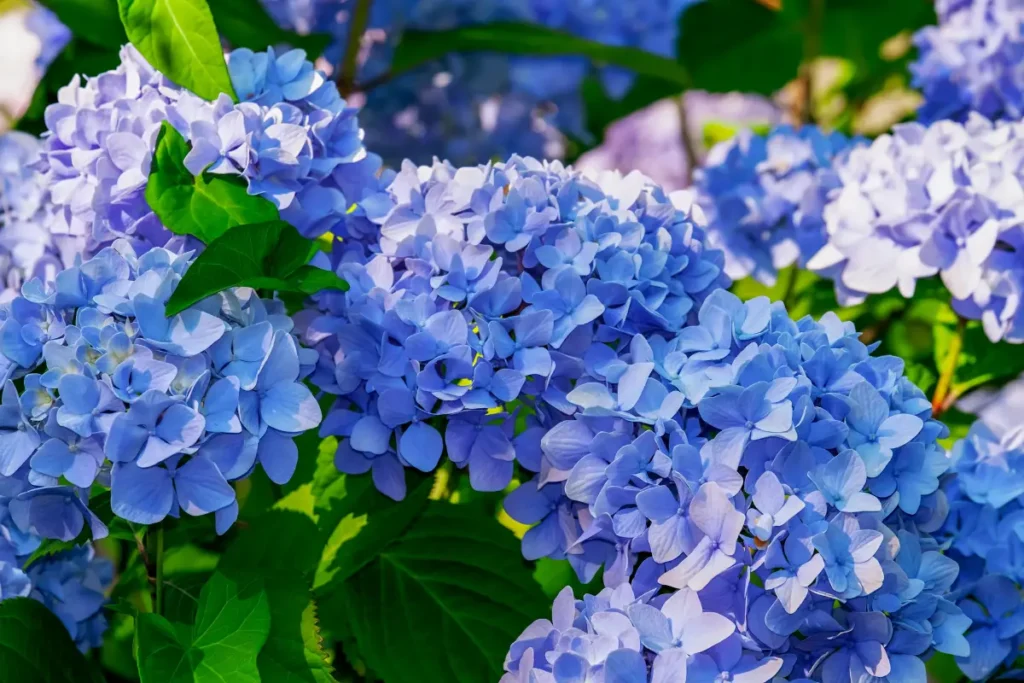
You May Also Be Interested In… Mastering Shampoo Ginger Lily Planting and Care
Cultivating Allergy-Friendly Gardens
Incorporating these budget-friendly, low-allergen flowers into your garden is just one step toward allergy relief. Here are a few more tips to ensure your garden remains a sanctuary:
- Regularly remove weeds and dead plants to reduce allergenic particles.
- Keep your garden well-watered to minimize airborne pollen.
- Consider wearing a mask and gloves while gardening, especially during high pollen seasons.
- Choose companion plants wisely; some plants can help deter allergenic insects.

Final Thoughts on Low Allergy Flowers for Your Garden
Gardening should be an enjoyable and accessible hobby for everyone, including allergy sufferers. By selecting these mind-blowingly affordable, low-allergen flowers, you can create a stunning garden that provides stunning allergy relief without breaking the bank. Don’t let allergies hold you back from the garden of your dreams. Plant these gorgeous blooms, breathe easy, and enjoy the wonders of your allergy-friendly garden.

Darrell has a passion for gardening that he inherited from his father. Go here to read more about the influence his father played in his love for gardening. If you want to send Darrell a quick message, then visit his contact page here.

![How to Water Indoor Plants [Plant Care 101]](https://wraxly.com/wp-content/uploads/2021/03/How-to-Water-Indoor-Plants-Plant-Care-101-1200-1024x576.webp)

![Growing Plants from Cuttings [A Simple Guide]](https://wraxly.com/wp-content/uploads/2021/03/Growing-Plants-from-Cuttings-A-Simple-Guide-1200-1024x576.webp)
